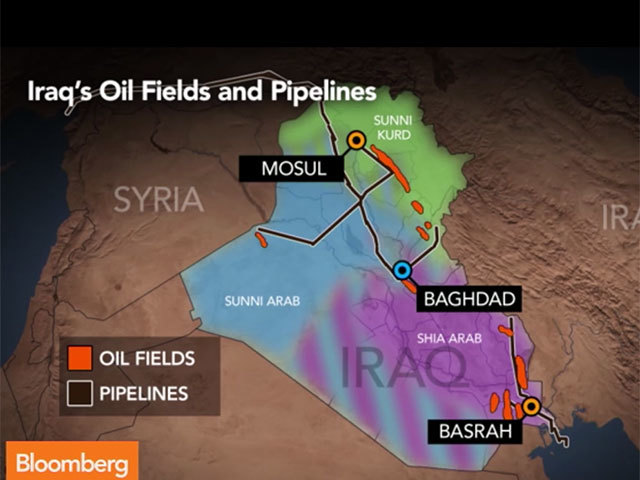
The rapid advance of Islamist militants across northern and central parts of Iraq surprised many. However, the momentum for the advance has been building for years.
The Sunni community has become increasingly frustrated with the Shi’ah dominated authorities in Baghdad for having marginalised them through alleged arbitrary arrests and a lack of investment among other things.
Groups such as the Islamic State of Iraq and the Levant (ISIL – recently renamed as the “Islamic State” or IS) openly oppose the government and the post-invasion democratic Iraqi state which has disenfranchised the Sunni community through simple demographics (there are thought to be more than two Shi’ah Arabs for every Sunni Arab in the country).
For now at least, many Sunnis therefore feel compelled to the support the group, despite its radical interpretation of Islam, as a “lesser of the two evils” when compared to the authorities.
With this support, the group has been able to seize Sunni parts of the country at speed. However, they will struggle to take and hold territory with larger Shi’ah communities. The security forces, backed up by rapidly expanding Shi’ah militia forces, will fight hard to defend these areas. The local Shi’ah population will also not support the militants as the Sunnis have, because the IS considers Shi’ahs to be infidels. It has already killed hundreds of them.
Instead, the momentum of the IS advance is likely to slow and fighting is likely to become entrenched and more bitter around religiously mixed parts of the central region.
Sectarian violence could intensify – especially in the event that terrorists manage to attack one of the four Shi’ah shrines in Samarra, Kadhimiyah, Karbala and Najaf. The bombing of the shrine in Samarra in 2006 catalysed a bloodbath of sectarian killings. IS figures have already threatened to attack these sites, and recent weeks have seen several attempts on the shrine in Samarra.
At the same time, while the militant advance may slow, the pace of terrorist attacks in areas still controlled by the government will not decrease. The Islamists will want to maintain pressure on the authorities. Given the importance of the energy sector to government revenue it will remain an attractive target for any organisation intent on attacking the state.
However, the majority of oil production is in the south, far from the current conflict area. It will be very difficult, albeit not impossible for terrorists to infiltrate the region to conduct an attack.
Similarly the terrorists will likely want to conduct terrorist attacks in Kurdish Regional Government (KRG) territory but it will be hard for them to penetrate the security measures of the comparatively well trained and equipped Peshmerga forces. Nonetheless, it will not be beyond the realms of possibility. Other considerations further down the line include the constitutional nature of the Kurdish region. As federal security forces fled the Sunni Arab north of Iraq, Kurdish security forces quickly moved into the oil-rich and hotly-contested city of Kirkuk in order to protect its residents from advancing militants.
This long-coveted piece of territory now falls under de facto Kurdish administration and there will be little appetite amongst the Kurdish population to give it up. Discussion of the region’s independence has also escalated; consolidation of Kurdish control over a new city and major oil and gas assets make the economic viability of such a state more realistic.
Various states in the region such as Turkey and, of course, federal Iraq itself will oppose such a move. Furthermore, while Baghdad may currently be weak, whoever governs the rest of Iraq in five, ten, 20 or even 100 years from now will likely still seek the return of Kirkuk. For now, the city may be largely protected by the Kurdish security forces, but it may be threatened once again in the longer term.
The Kurdish authorities therefore face a strategic and geo-political minefield in the years ahead. However, the region and its people are no stranger to difficult times and may yet be able to defy the difficult prospects which lie ahead.
The threat to foreign companies is certainly significant, with many reviewing their contingency plans or evacuating accordingly.
However, there is another emerging threat which has not yet received the same attention as the IS. Shi’ah militia groups are expanding rapidly as young men answer calls to defend their communities and shrines.
For the time being they will focus their efforts on tackling the Sunni fighters, but these groups have targeted Western interests and even specifically singled out the energy sector in the past.
While the headlines may be focused on the radical Sunni groups in the north and centre of the country, the rising spectre of potentially uncontrollable and unaccountable Shi’ah militancy may end up posing much more of a concern for foreign companies in the longer term.
John Drake is the head of Global intAKE, the intelligence and risk mitigation service of AKE Group